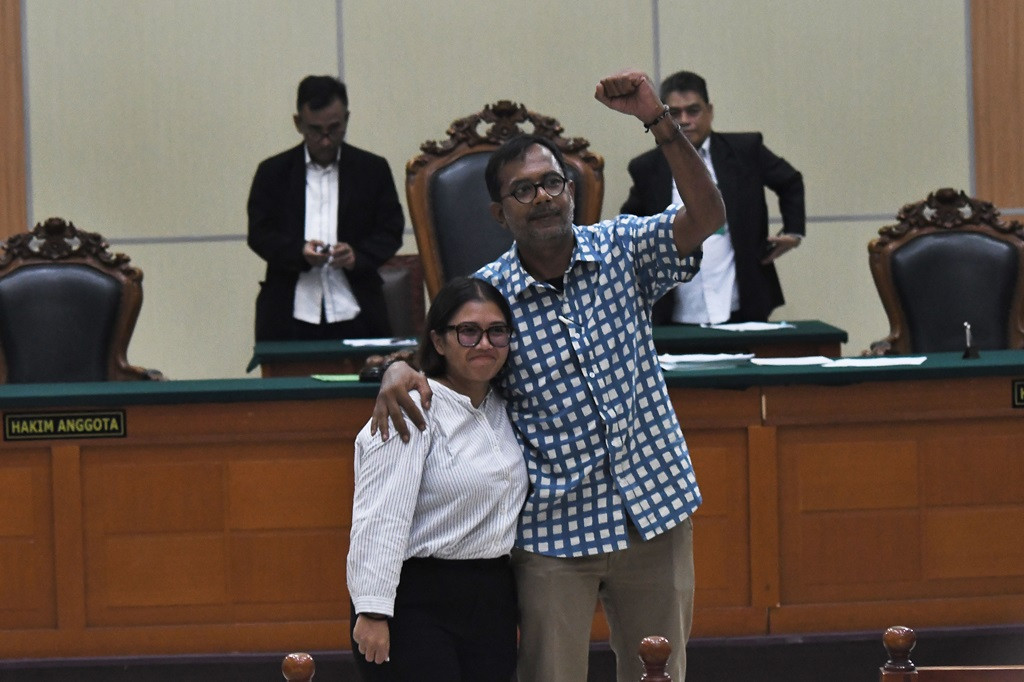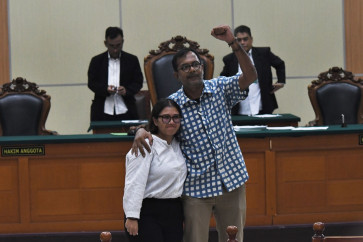Popular Reads
Top Results
Can't find what you're looking for?
View all search resultsPopular Reads
Top Results
Can't find what you're looking for?
View all search resultsConstitutional Court rules defamation clause ‘conditionally unconstitutional’
The Constitutional Court has ruled the Criminal Code’s Article 310 Clause 1, or the defamation clause, to be conditionally unconstitutional.
Change text size
Gift Premium Articles
to Anyone
 Human rights activists, Lokataru Foundation executive director Haris Azhar (right) and former KontraS coordinator Fatia Maulidiyanti (left), gesture to their supporters after the verdict hearing against them at the East Jakarta District Court on Jan. 8, 2024. A panel of judges at the court acquitted Haris and Fatia on all counts of defaming senior cabinet minister Luhut Pandjaitan in a YouTube video. (Antara/Fakhri Hermansyah)
Human rights activists, Lokataru Foundation executive director Haris Azhar (right) and former KontraS coordinator Fatia Maulidiyanti (left), gesture to their supporters after the verdict hearing against them at the East Jakarta District Court on Jan. 8, 2024. A panel of judges at the court acquitted Haris and Fatia on all counts of defaming senior cabinet minister Luhut Pandjaitan in a YouTube video. (Antara/Fakhri Hermansyah)
T
he Constitutional Court has ruled that Article 310 Clause 1 of the current Criminal Code (KUHP), which concerns defamation, is conditionally unconstitutional, meaning the stipulation has been deemed to be contradictory to the Constitution under certain conditions set out by the court.
The decision comes following a petition for judicial review of several articles of the KUHP by rights activists Haris Azhar and Fatia Maulidiyanti, both of whom were defendants in a court defamation case brought by Coordinating Maritime Affairs Minister Luhut Pandjaitan.
Both Haris and Fatia have since been cleared of charges after they were found to be not guilty.
Article 310 Clause 1 of the KUHP states, "Any person who intentionally harms another person's honor or reputation by specific accusation, with the obvious intent of publicizing it, shall be found guilty of slander and shall be punished to a maximum imprisonment of nine months or a maximum fine of Rp 4,500.”
In contrast, Article 433 of Law No. 1/2023, the new Criminal Code which will only take effect in 2026, stipulates that these acts of defamation need to be made verbally.
Hence, the court has ruled that the phrase “verbally” should be adopted in the defamation provision of Article 310 section 1 of the current Criminal Code.
"So that its application does not create ambiguity," said Judge Enny Nurbaningsih during the reading of the decision on Thursday, as quoted by Kompas.com.


















